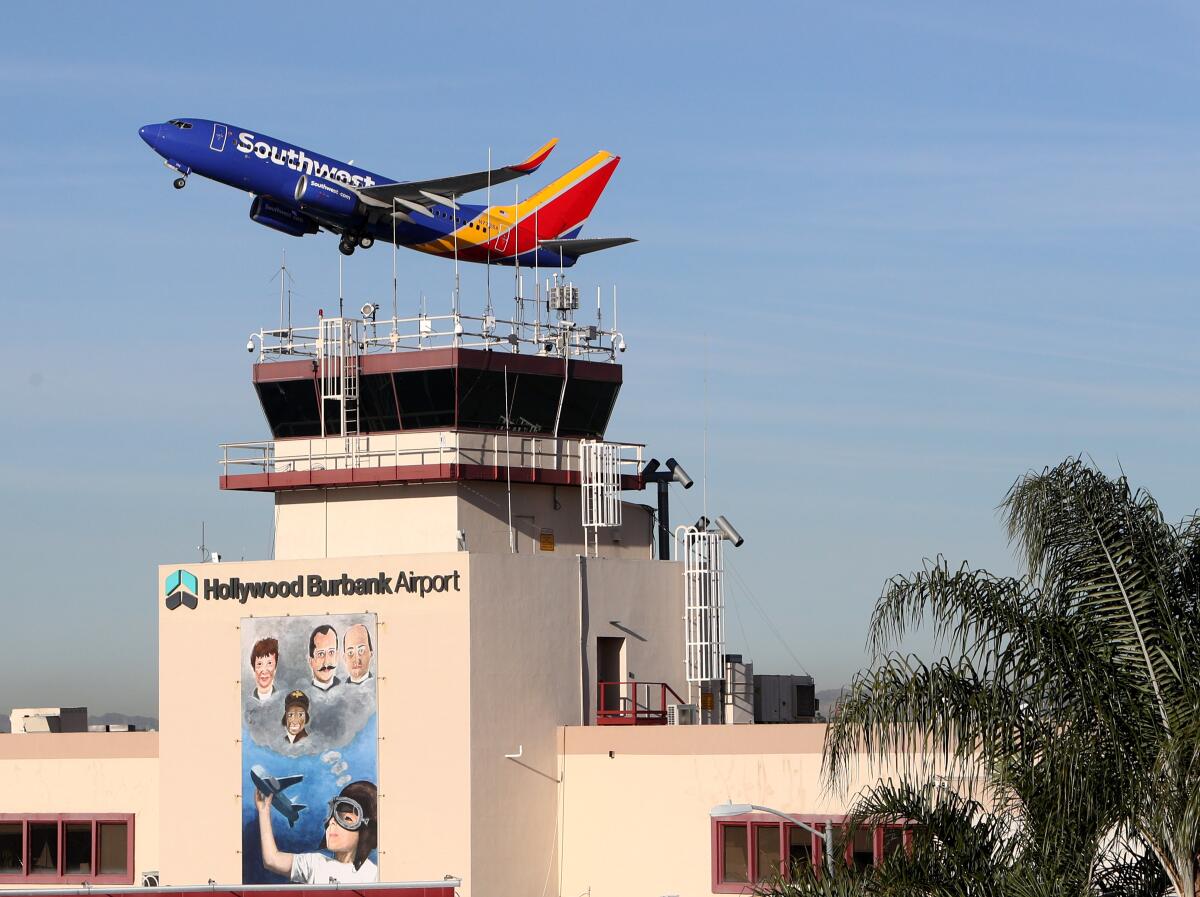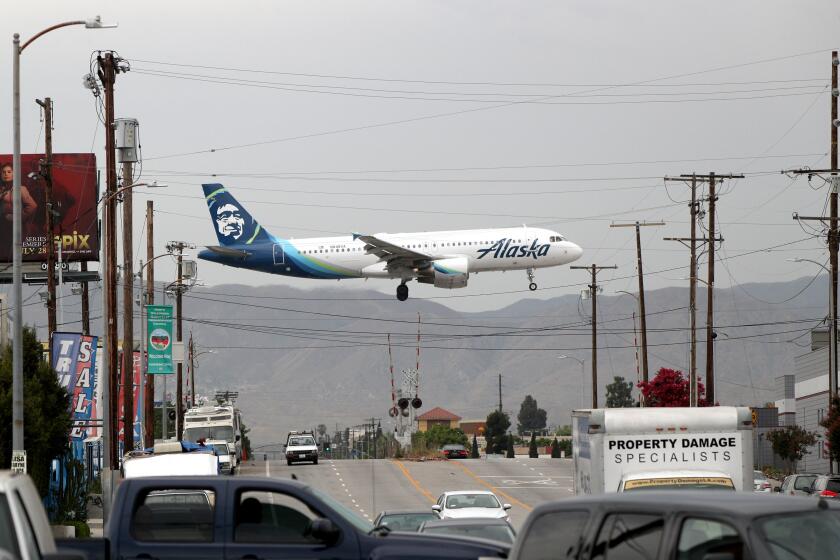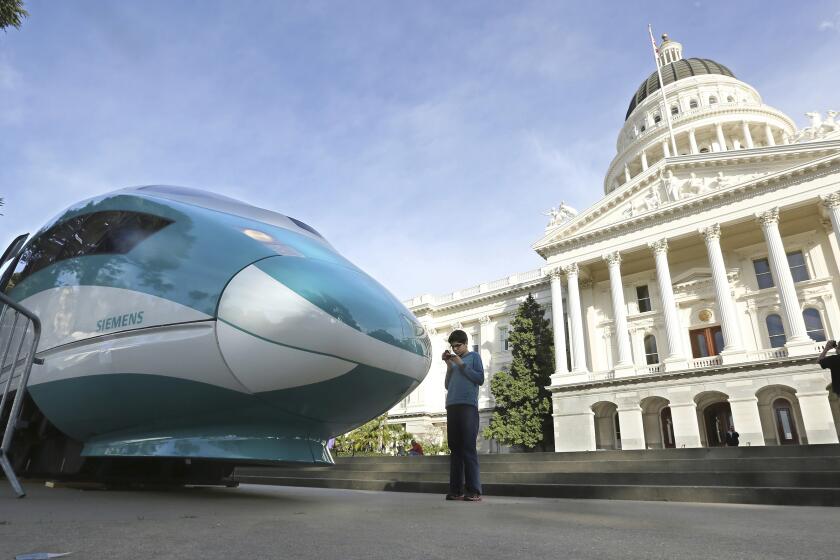Hollywood Burbank Airport files environmental lawsuit against California’s bullet train

- Share via
In the first legal challenge to the California bullet train’s impacts in the Los Angeles region, Hollywood Burbank Airport has filed an environmental lawsuit that asks for the project’s approvals to be put on hold.
The suit alleges that the rail authority’s plans for tracks and an underground station near the airport could affect its operations and safety. It asks the state agency to reformulate its designs with a new environmental impact report that it would circulate for public comment.
The suit was triggered by the rail authority issuing a final environmental impact report on the 13.7-mile Los Angeles-to-Burbank segment. The rail board approved the report on Jan. 13, despite letters from city and airport officials that raised a wide range of concerns.
If the airport succeeds in asserting the rail plan would harm its operations, it is unclear what mitigations the rail authority would be forced to make and how much delay it would cause. In the worst case, the suit could force the rail authority to move its right of way, requiring a new environmental analysis and considerable additional costs.
Local officials warn of impacts from California high-speed rail project on Hollywood Burbank Airport and Burbank’s water supply.
In practical terms, the state lacks the money to build any of the segments for the 500-mile bullet train system outside of the Central Valley, but it is trying to complete all of the environmental planning, including route selections, by next year.
The airport, operated by a joint authority of Burbank, Glendale and Pasadena, alleges that the rail authority deferred an analysis of how construction would impact the airport operations, including a tunnel near or on the airport property. Such deferred analysis, the suit asserts, is not permitted under the California Environmental Quality Act.
“The draft EIR failed to fully analyze, disclose, and mitigate potential project impacts on the airport, including to the safety of the airport’s operations,” the suit says, adding that the rail authority would offer additional details at some unspecified future date with no standards for what it would include or how it would avoid significant impacts.
The airport authority had no comment beyond the lawsuit, a spokeswoman said.
A spokeswoman for the rail authority called the lawsuit “unfortunate” but declined to comment further, citing the pending litigation.
She added that rail authority Chief Executive Brian Kelly will sign the environmental report, certifying the record of decision, “as he has all others within the typical window of time,” which is expected within the next few weeks. But a rail authority official, who is not authorized to speak to the news media, said the lawsuit appears to have already delayed the signing.
The airport is not the only party with significant concerns about the urban rail segment, which would travel on a right of way that carries Metrolink trains.
The Burbank City Council submitted an eight-page letter to the rail authority on Jan. 19 that lists a range of concerns involving future noise, transportation and community impacts.
It includes the assertion that the expanded rail operations on the Metrolink alignment, which would add two sets of tracks, will further divide the city. Among other things, it asks for consideration of a longer tunnel than is currently planned, a potentially costly change.
Burbank city water officials say the construction will temporarily take out 75% of the city’s water supply and force it to recertify its system for treating solvent contamination with state regulators afterward.
And Avion Burbank, a large commercial, industrial and residential development near the airport, would be condemned under the state rail authority’s plan.
The 61-acre complex on North Hollywood Way could cost the rail authority more than $900 million to condemn and affect about 2,000 permanent jobs, according to its owner, Overton Moore Properties. The company sent a 225-page document laying out its concerns last year.
The $105-billion Los Angeles-to-San Francisco train has faced numerous suits in the Central Valley that have been blamed for delays, increased costs and design compromises that hobbled the construction for nearly a decade.
In a new draft business plan, the California High-Speed Rail Authority acknowledged that costs have risen roughly $5 billion.
The suits were filed by rural counties, cities of various sizes, irrigation districts and farm bureaus, alleging that environmental reports failed to account for the impacts that the construction and operation of the 220-mph train would have on local communities.
The airport, which handled 2.7 million arriving passengers in 2019, is a potentially stronger plaintiff than the authority has faced in the past decade, with net assets of about a half-billion dollars, according to its financial reports.
“They could be formidable,” said Stuart Flashman, a Sacramento attorney who represents plaintiffs against the rail project in the Central Valley. “They have a fair amount of money in their pocket and they probably have a contingency for legal actions.”
Separately, Flashman said a legal challenge to the constitutionality of the rail project is still alive after the California Supreme Court extended its review of an appeal and asked the rail authority to answer questions the appeal raised.
The suit’s lead plaintiff, farmer John Tos, alleged that the project violates the California Constitution by illegally amending the 2008 bond act. An appeals court last year rejected the suit.
More to Read
Sign up for Essential California
The most important California stories and recommendations in your inbox every morning.
You may occasionally receive promotional content from the Los Angeles Times.













